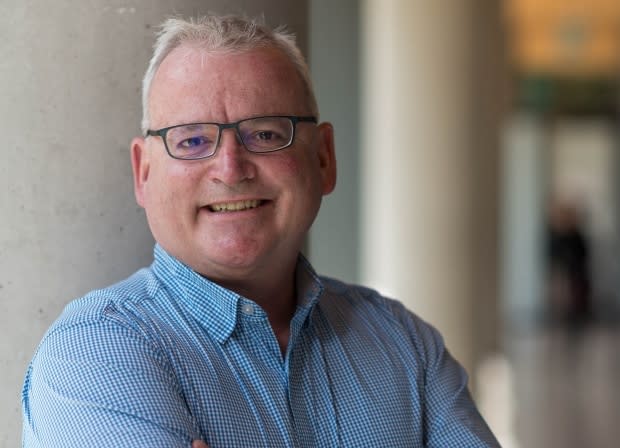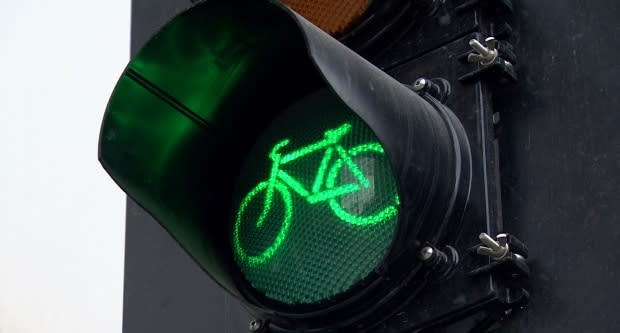Why COVID-19 may bring us the summer of free-range kids
Is this the summer of the free-range kids?
With the pandemic shutting down most of the structured activities, kids who would normally be shuttled to a summer camp can now be seen roaming the streets, hanging out at parks and riding bikes.
And Guy Faulkner, an advocate for free-range kids, believes this is a very good thing.
"We know that kids who have independent mobility are more physically active, that they're more likely to be walking or cycling to school, they're more likely to be walking or cycling to parks," Faulkner told Alberta at Noon. "And when you go to a park you engage in physical activity and play. Essentially, when children are outside they move more, they sit less and they play longer."
It's no secret that kids today are less active than a generation ago.
Faulkner, a professor at UBC's school of kinesiology, said kids have also become less independent.
"Independent mobility is that technical term really for a child's freedom to travel and play in a neighborhood without adult supervision. And that's the key — that it's without adult supervision. So they're engaging in activity with other kids with their friends, with sisters and brothers but they're not being 'supervised' so to speak," Faulkner said.
"We know physical activity is tremendous for physical and mental health but we also know that physical activity levels of children and youth, and adults, has been on a slow decline over the last few generations."

Faulkner said natural play is just somehow different from organized play.
"They make up games, they're engaging in play … we think that whilst kids still are engaged in more structured forms of sport for example — that's not necessarily the answer," Faulkner said. "What we've seen is more a decline in that kind of incidental physical activity of just walking or cycling to places throughout the day."
Faulkner said we need to find ways to get back to this.
"There are a range of other important benefits of independent mobility beyond just physical activity," he said. "Independent mobility has been associated with a range of mental health and developmental benefits — improved risk assessment, higher self-confidence and better navigation, way-finding skills."
Faulkner said kids with siblings tend to get more freedoms, due to the safety of travelling in a group. But a good sense of neighbourhood also helps.
"Some of the factors before COVID-19 really were more concentrated on concerns and perceptions of safety and concerns about traffic laws or stranger danger, that present barriers for parents in feeling confident in letting their kids be more independent outdoors," Faulkner said. "Mobility is higher where there's social connections, where there is a sense of a neighbourhood, a sense that parents have friendly eyes on the street ... where there are a bunch of kids who can play and interact together."
Faulkner said parents can build up those networks within their neighbourhood.
"Getting to know neighbours, identifying where locations such as green spaces or playgrounds or shops that your child can go to and they can also go to for help if they need it, is all part of this process," he said.
"Partly it may be a role for parents, making those connections in the neighborhood, and trying to promote a sense of social cohesion so that kids know other kids, so that parents feel that there are other parents out there keeping an eye on their kids."
Amy Mercure, who called in to Alberta at Noon, has been doing just that, thanks to COVID-19.
"We have ended up going outside every day at four o'clock, and we meet all of our neighbours all around us," she said. "It's brought everyone out. We do our best to social distance, and that's easier when the kids have bikes and that sort of thing outside, and it's just been a fantastic community building experience for us on our street, and for meeting our neighbours and just free play for our children every day, and they look forward to that."
Mercure said the main safety concern in her Marda Loop neighbourhood is traffic.

Alberta at Noon caller Ryan Billard, who has three daughters aged 14, 12 and nine, is all for giving kids a bit more room to roam.
"We have kind of loosened our leash, so to speak, on our kids and let them have more freedom which is good by me," he said. "My wife's always been a little more apprehensive for this, but I grew up in the '80s and I would leave after breakfast and come home at lunch, and then back out, and back for supper."
Billard said his daughters can head out on bikes as long as they check in regularly.
"They're riding bikes. They're going around and exploring the community, which is great," he said. "With the younger two, they have to check in within an hour of leaving just to make sure everything is kosher."
Billard also raised the concern of screen time and phones, asking whether kids sometimes have to be strongly encouraged to go outside and just play.
"Today's society of the helicopter parents has left little freedom to the kids," Billard said. "We've arranged their play dates for them and called the parents to see if the other kids want to play, whereas back when we were younger, you picked up the phone and you called them or you just went over and knocked on their door."
Faulkner said that cell phones have given todays' parents a bit more peace of mind.
"A child has greater independent mobility if they have a phone," he said. "But at the same time, is that really, truly independent mobility? Because you're still kind of monitoring as a parent."
Another concern is the judgment of others — or of estranged spouses.
"I have questions about the legalities of things, in terms of age and what might be seen as neglect," said Ken from Edmonton, who did not want his last name used. "I'm dealing with custody issues and stuff. I don't want it in court. I don't want it to be used against me that I let her go outside, right?"
Recently in Vancouver, a father of five was investigated by social workers after receiving a anonymous complaint that his four oldest children — aged between 11 and 7 — were taking public transit together without adult supervision. B.C.'s highest court eventually ruled in his favour, but the battle took years.
And then there's that eternal fear of every parent, kidnapping.
"The stranger danger is certainly a concern that we all have as parents, but the actual likelihood of a child being abducted is rare and unlikely. I mean you have more chance of winning the lottery," Faulkner said.
"When you as a parent feel confident that the child has an understanding of how to cross the road, of what to say if a stranger approaches them, that the child knows where there are friendly adults or neighbours that they can turn to if they need help," he said. "So I think that's more the critical issue is having that conversation … when you feel ready then you can start those trial runs of allowing independent mobility ... and then then allowing that to kind of gradually increase."
Faulkner says it may take some rethinking for parents to get comfortable with letting their kids roam free.
"Certainly those concerns are valid, but it's about you know trying to expose yourself to overcoming some of those concerns by preparing your child as much as you can, and knowing the incredible benefits that come with this sort of independent mobility," he said. "We know that being outdoors, particularly in this context of a pandemic, is perhaps the safest place for a child to be."
Most people who called in to comment at Alberta at Noon seemed to like the idea.


